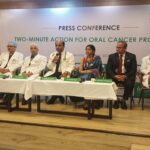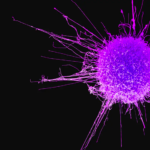World Cancer Day- 4th February
India
healthysoch
New Delhi, February 03, 2023:
 Every year in India 1.39 million new cancer cases are detected. By 2025 the annual incidence of cancer in India is projected to be 1.5 million. Every year 8.5 lakh patients die due to cancer in India. This makes cancer a big problem. There are both non modifiable risk factors in the form of gene associated and familial cancer and modifiable risk factors which may predispose to cancer. With latest advances in health care practice, many of these cancers are curable if they are detected in early stages.
Every year in India 1.39 million new cancer cases are detected. By 2025 the annual incidence of cancer in India is projected to be 1.5 million. Every year 8.5 lakh patients die due to cancer in India. This makes cancer a big problem. There are both non modifiable risk factors in the form of gene associated and familial cancer and modifiable risk factors which may predispose to cancer. With latest advances in health care practice, many of these cancers are curable if they are detected in early stages.
Around 45% of cancers arise mainly from oral cavity, breast, female reproductive system, lung, stomach. These cancers are mainly caused by many modifiable risk factors like tobacco consumption, alcoholism, lifestyle problems, social factors, and also infections like human papilloma virus.
Worldwide cancer prevention strategies focus on these modifiable risk factors through primary prevention and secondary prevention. Primary prevention involves the avoidance of risk factors that may cause cancer. This includes cessation of smoking, reduced consumption of alcohol, healthy lifestyle changes, vaccination against Human Papilloma virus.
Diet plays a major role in cancer prevention. American Institute of Cancer research (AICR) recommends Low alcohol, Low Calorie, Low fat, High dietary fibre, Low red meat and Low processed meat in diet for prevention of cancer.
Government of India in 2003, passed Cigarettes and other tobacco products act (COTPA act) which prohibited advertisement of tobacco products, smoking in public places, sale of tobacco products near educational institutions and also mandated depiction of statutory warnings on tobacco packs and tar and nicotine contents along with maximum permissible limits on tobacco pack.
Human Papilloma virus infection is the most common cause of cervical cancer in women. Various vaccines are developed in bivalent, quadrivalent and nanovalent forms providing protection against human papilloma virus infection. 80% of cervical cancers can be prevented with HPV vaccination to girls between 9-14 years of age. Government of India launched first Indigenous Cervical vaccine which is a quadrivalent vaccine in September 2022 there by reducing the cost burden of vaccination on individuals. As per NTAGI recommendation, cervical vaccine is expected to be integrated into the Universal immunisation schedule for girls aged between 9-14 years of age.
Apart from the Government initiatives as an individual one should have a knowledge on the life style risks that can lead to cancer such as habits, sedentary life styles, avoidance of breast feeding etc. A personal change to lead a healthy lifestyle will protect a person from cancer to some extent.
Secondary prevention includes regular screening of most common cancers, to facilitate the diagnosis of cancer in a early stage thereby increasing the chances of cure. Government of India under National Programme for Prevention and control of Cancer, Diabetes, Cardiovascular diseases and Stroke (NPCDDCS) mainly focusses on prevention strategies in form of health education regarding hazards of tobacco consumption, necessity of genital hygiene and also launched various screening programmes in regional cancer centres for ca cervix, breast and oral cancer.
As a person its important to know the presence of any history of cancer in the family, identifying the risk of cancer in self and also undergoing regular screenings accordingly. For women, screening for cervical cancer starts at age of 21 years in form of pap smear and breast cancer starts age of 45 years in form of self breast examination, mammograms, physical examination. Regular health check-ups for any ulcers in oral cavity or any bowel disturbances will help in diagnosing oral cavity cancer and colorectal cancer early. For men above 50 years a blood test in form of PSA will help in screening for prostate cancer.
However Prevention is always better than cure. A healthy lifestyle with proper precautions will help in preventing many cancers to an extent.
Author: Dr. P. Vijay Anand Reddy, Director, Apollo Cancer Centre, Apollo Hospitals, Hyderabad.
healthysoch







